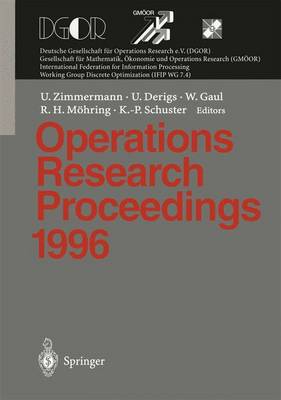Operations Research Proceedings
1 primary work
Book 2000
Operations Research Proceedings
Published 27 May 1997
The volume contains a selection of manuscripts of lectures presented at the International Symposi- um on Operations Research (SOR 96). The Symposium took place at the Technical University of Braunschweig, September 3-6, 1996. SOR 96 was organized under the auspices of the two German societies of Operations Research, Deutsche Gesellschaft fur Operations Research (DGOR) and Gesellschaft fur Mathematik, Okonomie and Operations Research (GMOOR) in cooperation with the Working Group Discrete Optimization of the IFIP (WG7.4). Since 1995, DGOR and GMOORjointly prepare the Symposium as a common annual conference. In particular, the annual general meetings of the DGOR, the GMOOR and the WG7.4 took place during the conference. The Symposi~m had 527 participants from 32 countries around the world, including 92 partici- pants from Eastern Europe. The Symposium obviously attracts an international audience of workers fully covering the broad spectrum of Operations Research and related areas in economics, mathema- tics and computer science. The importance of a highly interdisciplinary field as Operations Research is increasing owing to the growth in applications in related disciplines.
Technological advances in computer science and algorithmic mathematics are crucial for attacking the great challenges waiting in the areas of applications of Operations Research effectively. As a participant of SOR 96 one could well observe the current pace of achievements. Many of these results are in these proceedings. The program consisted of two plenary, 17 semiplenary, and 335 contributed lectures in 18 sections.
Technological advances in computer science and algorithmic mathematics are crucial for attacking the great challenges waiting in the areas of applications of Operations Research effectively. As a participant of SOR 96 one could well observe the current pace of achievements. Many of these results are in these proceedings. The program consisted of two plenary, 17 semiplenary, and 335 contributed lectures in 18 sections.
